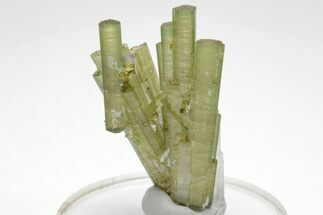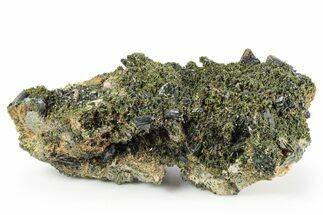This Specimen has been sold.
2.3" Green Olivine Peridot Crystal Cluster with Magnetite - Pakistan
This is a wonderful, 2.3" long, green olivine peridot crystal cluster with nice terminations, collected from Kaghan Valley in the Khyber Pakhtunkhwa Province of Pakistan. There are small magnetite crystals along the underside of this specimen. The magnetite has excellent magnetic properties!
This specimen has been mounted to an acrylic display base with mineral tack.
This specimen has been mounted to an acrylic display base with mineral tack.
About Pakistan Peridot
Peridot is a magnesium iron silicate mineral with the basic chemical formula Mg2SiO4. It is a gem variety of the mineral forsterite, and ranges between yellow, olive, and brownish green depending on the amount of iron present during formation. Dark, olive green-colored peridot gems are typically the most sought after.
Peridot was originally named as topaz and was used for a variety of reasons, whether it be during the Crusades as a way to adorn religious objects, or even thought by many to posses medicinal powers. For unknown reasons, the original name was removed and given to the mineral that most know as topaz today, sometime during the 18th century. Peridot has remained pertinent throughout the years, and is considered the August birthstone.
Specimens from the Kaghan Valley of Pakistan are highly sought after by collectors for their color, quality, and in some cases their inclusions. These peridot crystals are often found in association with magnetite and calcite, and will occasionally contain ludwigite inclusions.
Many gem-quality specimens were originally in basalt nodules in the Earth's mantle, and were fragmented and brought to the surface by volcanic activity. Large peridot crystals are often found in some types of rare, stony-iron meteorites know as pallasites.
Peridot is a magnesium iron silicate mineral with the basic chemical formula Mg2SiO4. It is a gem variety of the mineral forsterite, and ranges between yellow, olive, and brownish green depending on the amount of iron present during formation. Dark, olive green-colored peridot gems are typically the most sought after.
Peridot was originally named as topaz and was used for a variety of reasons, whether it be during the Crusades as a way to adorn religious objects, or even thought by many to posses medicinal powers. For unknown reasons, the original name was removed and given to the mineral that most know as topaz today, sometime during the 18th century. Peridot has remained pertinent throughout the years, and is considered the August birthstone.
Specimens from the Kaghan Valley of Pakistan are highly sought after by collectors for their color, quality, and in some cases their inclusions. These peridot crystals are often found in association with magnetite and calcite, and will occasionally contain ludwigite inclusions.
Many gem-quality specimens were originally in basalt nodules in the Earth's mantle, and were fragmented and brought to the surface by volcanic activity. Large peridot crystals are often found in some types of rare, stony-iron meteorites know as pallasites.
SPECIES
Forsterite var. Peridot & Magnetite
LOCATION
Kaghan Valley, Mansehra District, Khyber Pakhtunkhwa Province, Pakistan
SIZE
2.3 x 1.5"
CATEGORY
ITEM
#185288
 Reviews
Reviews













